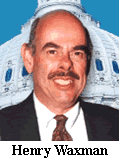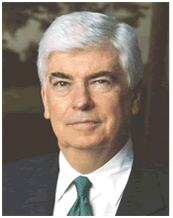HENRY WAXMAN’S SNEAK ATTACK ON DIETARY SUPPLEMENTS
By
Sarah Foster
Posted 1:00 AM Eastern
May 4, 2010
© 2010 NewsWithViews.com
WASHINGTON
– Last week and over the weekend, the Internet was buzzing about
a heretofore undetected provision Rep.
Henry Waxman, D-Calif., had slipped into the Wall Street financial
 reform
bill that the House passed in December – a provision critics warned
could devastate the nutritional supplement industry with excessive regulations,
driving up the costs of supplements or removing them from the market
altogether.
reform
bill that the House passed in December – a provision critics warned
could devastate the nutritional supplement industry with excessive regulations,
driving up the costs of supplements or removing them from the market
altogether.
“The Wall Street Reform and Consumer Protection Act of 2009 (H.R. 4173) …includes language going far beyond finance,” the Alliance for Natural Health-USA, a D.C.-based health freedom advocacy group, stated in an April 27 report, with the warning: “This language could be used for an end run around the Dietary Supplement Health and Safety Act (DSHEA), the legislation that governs dietary supplement regulation by the FDA.”
DSHEA was passed by Congress in 1994 in response to public outrage over a series of FDA armed raids on health food stores and alternative medicine clinics; it’s the landmark law designed to protect access to dietary supplements and to information about these products.
The Waxman provision does not affect DSHEA. It has nothing to do with lending institutions or financial matters, nor does it refer to the Food and Drug Administration, the agency tasked with regulating dietary supplements. Instead, it deals with the Federal Trade Commission, an agency set up in 1914 to protect the public from allegedly deceptive advertising and “anti-competition” business practices.
“A direct attack on supplements would take the form of an amendment to DSHEA, since that legislation governs FDA regulation of supplements,” ANH-USA explains. “In this case, Waxman has left DSHEA alone, and has instead inserted language in the Wall St. ‘reform’ bill that gives the Federal Trade Commission important new powers that could be used to circumvent key supplement protections in DSHEA.”
Every Sector of the Economy
The health foods industry is not the only industry that would be threatened by the provision.
The ANH-USA report points out: “Five unelected FTC commissioners would issue binding regulations in a wide range of areas, including the regulation of dietary supplements. And companies that did not comply with the new FTC rules could effectively be put out of business.”
Which is why the U.S. Chamber of Commerce and 40 advertising trade associations sent a letter (dated Apr. 22) to Senate Majority Leader Harry Reid, D-Nev., and Minority Leader Mitch McConnell, R-Ky., charging that FTC’s enforcement authority would be expanded over “virtually every sector of the American economy,” including advertising:
"The proposed expansion of FTC authority envisioned in H.R. 4173 would reverse the considered decisions of two earlier Congresses, granting such sweeping powers that the Commission could essentially act as an unelected legislature, governing industries and sectors that had nothing to do with the financial crisis," the letter states, adding, "Granting the Federal Trade Commission broad new authority across all but a few sectors of the American economy is not a necessary or relevant response to the causes of the recent recession."
The letter emphasized that H.R. 4173 would allow the FTC to expand its rulemaking and enforcement capabilities and add enforcement powers to seek civil penalties for “unfair or deceptive acts” without the requirement of coordination with the Department of Justice.
Still, although other businesses will be impacted, given Waxman’s long-standing opposition to the health foods industry, the AHN-USA fears dietary supplement manufacturers and sellers will be the FTC’s first targets.
“The bottom line is that FTC would be given power to regulate areas they don’t understand, and their first order of business would likely be to regulate supplements, an area far outside their area of expertise,” the report states.
A Similar Amendment for Dodd’s Bill?
Adding
urgency to the issue, ANH-USA has learned from inside sources that Sen.
Rockefeller, D-W.V., plans to propose a similar amendment for S.
3217: Restoring American Financial Stability  Act
of 2010 -- a Senate-side version of H.R. 4173 that Sen.
Chris Dodd, D-Conn., introduced April 15 and is being hotly debated
by the full Senate.
Act
of 2010 -- a Senate-side version of H.R. 4173 that Sen.
Chris Dodd, D-Conn., introduced April 15 and is being hotly debated
by the full Senate.
As of May 3 that amendment has not been introduced, but even if it’s not in the final version of the Senate bill it could still make its way into law through the conference process when S. 3217 and H.R. 4173 are combined and differences between the two are ironed out. That’s assuming S. 3217 will be passed.
For further clarification NewsWithViews contacted attorney Gretchen DuBeau, legal and executive director of ANH-USA, who provided insight not only into the ramifications of the Waxman amendment but its relationship to Sen. John McCain’s Dietary Supplement Safety Act (S. 3002), a bill that ignited a firestorm of outrage when introduced in February, in the face of which McCain withdrew support just a month later.
First, DuBeau explained, although McCain pulled his support from his bill it is not dead, because a bill cannot be withdrawn unless there is unanimous consent by the Senate. It could be revived by McCain or another senator later this session, though DuBeau does not think that is likely. She said McCain is trying to work out a deal with Senators Orrin Hatch, R-Utah, Tom Harkin, D-Iowa, and others to incorporate some of his ideas into S. 510: the FDA Food Safety Modernization Act.
“Some of the provisions [McCain] wants included are 1) a requirement that dietary supplement companies register with the federal government and 2) a provision giving the FDA authority to pull supplements from the market,” said DuBeau. “There were similar provisions already in the Food Safety Bill that were much more favorable for the supplement and natural health community, and that language is not going to change. So McCain won’t be successful there. Nothing scary from McCain is going to make it into the Food Safety Bill,” she added.
New Powers to the FTC
Said DuBois: “I want to be clear: The Waxman provision does not mention dietary supplements. What it does is give the FTC powers to regulate, and they have a lot of internal policies that they will now have authority to turn into law. For that reason many industries and organizations are opposing it as well, such as the Chamber of Commerce.
“The provision would reinstate full authority for the FTC to create rules pursuant to the Administrative Procedures Act [U.S. Code, Title 5]. This authority was diminished with the Magnuson-Moss Act in 1975 and 1980 because the FTC was overreaching and was regulating areas substantively, when they were only supposed to look at whether something is deceptive advertising.
“Congress gave the FTC a bunch of hurdles to jump over, making it difficult for them to regulate in any area that was controversial -- so the FTC has had limited powers to regulate for the past 30 years. The provisions by Henry Waxman would reinstate that power to the FTC.
“So a company could have something on its website that’s perfectly legal under DSHEA, but that the FTC might disagree with. For example, a company might claim that calcium promotes strong bones. That’s perfectly acceptable under DSHEA, which is regulated by the FDA. A company can put that on their website, which is by definition an extension of the label of the dietary supplement.
“FTC could look at that and tell the company, ‘Well, that’s advertising and you have to jump through all these hoops and do really expensive trials to prove it’ – which is difficult for natural product companies to afford to do because they don’t patent their products. That’s a whole different ball game from pharmaceutical companies.
“The concern is that FTC, with reinstated powers, will be able to formalize what they now do on a case-by-case basis and turn that into law by requiring everybody to do that,” DuBeau said.
“A Sneaky, Backdoor Way of Doing Things”
When word about Waxman’s amendment began moving across the Internet, bloggers were quick to criticize ANH-USA and other health freedom groups for not catching it earlier. DuBeau admits “we missed it,” but emphasizes that the way Waxman went about it is such a “non-traditional route it would be almost impossible for anyone to figure out.”
Said DuBeau, “It’s fair to that say that we missed it, but let me put it this way: Congressman Waxman has consistently stated his intent to increase regulations for the dietary supplement and natural health community. So we as an organization that protects access to natural medicine are constantly on alert to see what Congressman Waxman is doing in areas that impact the FDA or specific legislation impacting supplements, such as DSHEA.”
DuBeau described Waxman’s tactic as “sneaky,” but also “really brilliant,” because he did not go the normal route via the FDA, but chose an agency without authority to regulate supplements, and given that agency increased authority that could impact the regulation of supplements.
| Subscribe to the NewsWithViews Daily News Alerts! |
“It’s hard to see that,” DuBeau noted. “A lot of other groups – like the car dealers association -- have been making a big fuss recently about increasing FTC powers, and when we took a look we realized it could certainly impact access to supplements as well. That’s why we put out an alert and did an article about it.”
“This is such a sneaky, backdoor way of trying to derail DSHEA, it would be almost impossible to catch,” she said. “We’re thrilled that we did catch it at this point and hope that we’re able to have the provision removed from the final bill during the conference process.”
NOTE: Petition: ANH-USA has a Petition online for protesting expansion of FTC powers and urging Congress to keep the Waxman provision out of the final version of the financial bill.
Earlier Stories
1
- Scott Tips: John
McCain's Bill S. 3002 is an Overkill on Dietary Supplements: March
10, 2010. Two parts
2 - Jonathan Emord: McCain
to FDA: Regulate Joe the Plumber: Feb. 15, 2010
3 - Sarah Foster: Michele
Bachmann Warns: "Financial Bill Worse than Healthcare Measure":
Dec. 16, 2009
4 - Jim Kouri: Obama,
Congress Strive to Bankrupt America: Dec. 13, 2009
Resources
1
- S.
3217: Restoring American Financial Stability Act of 2010, introduced
April 15 by Chris Dodd, D-Conn., with no sponsors. Presently being debated
by the Senate.
2 - H.R.
4173: The Wall Street Reform and Consumer Protection Act of 2009,
introduced Dec. 2 by Barney Frank, D-Mass., with no co-sponsors. Passed
by the House Dec. 11; 223-202
3 - S.
3002: Dietary Supplement Safety Act of 2010, introduced Feb. 3 by
Sen. John McCain, R-Ariz., with Sen. Byron Dorgan, D-N.D., co-sponsor.
Support withdrawn March 4.
4 - Congressman
Waxman Slips Obscure Anti-Supplement Measure into Wall St. "Reform"
Bill: Alliance for Natural Health-USA, April 27, 2010
5 - James Gormley: Our
World Without DSHEA: Natural Products Foundation, February 2009.
6 - David Regan: Letter
to Sen. Jay Rockefeller, Chr. of the Senate Committee on Commerce, Science
and Transportation. Nat’l Automobile Dealerships Association,
March 12, discussing impact of weakening of the Magnuson-Moss provisions
on auto-dealerships and the economy as a whole. Regan is V.P. of Legislative
Affairs for NADA.
© 2010 NWV - All Rights Reserved
















